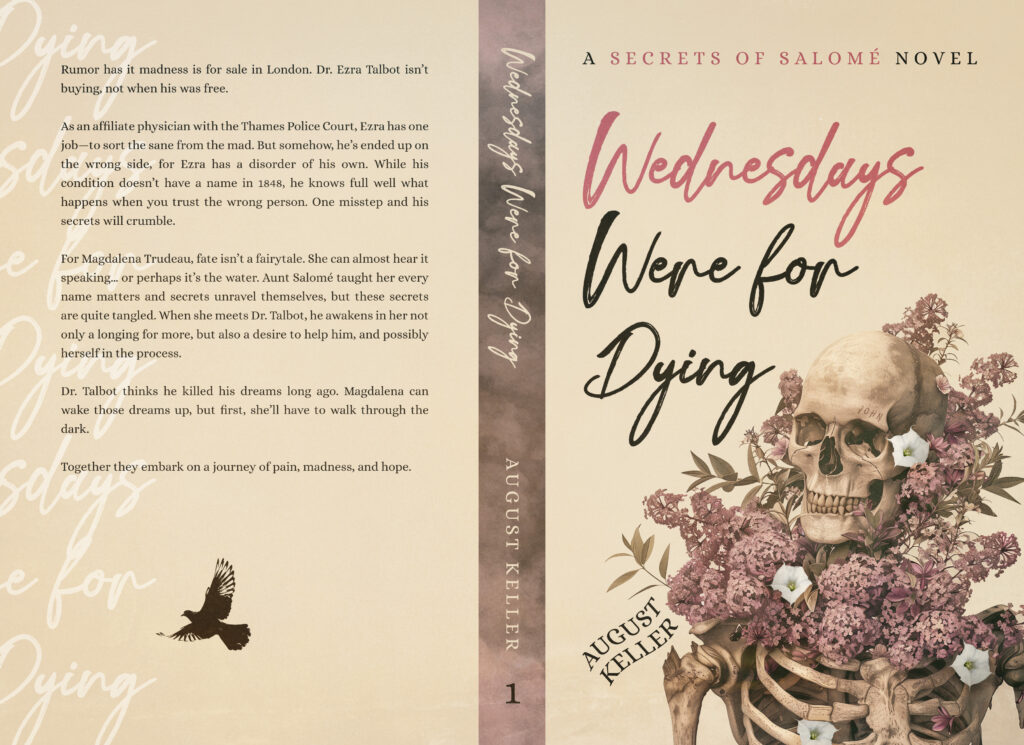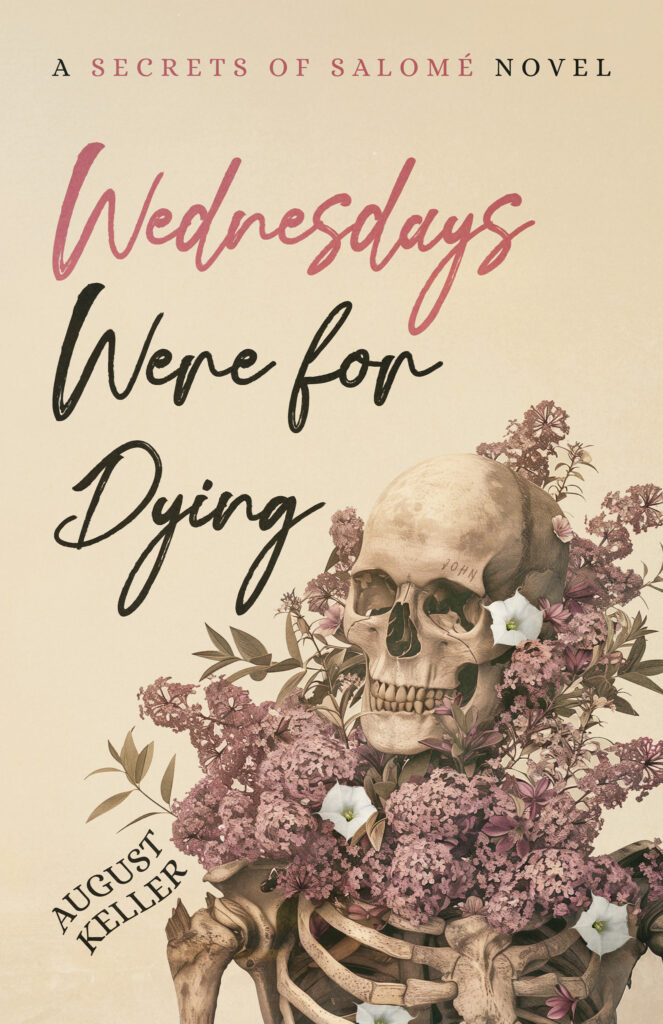In a world where stories can heal, August Keller’s debut novel, Wednesdays Were for Dying, emerges as a beacon of hope and resilience. Drawing inspiration from her experiences as a teacher and her personal journey with neurodivergence, August weaves a narrative that resonates with the struggles and triumphs of those grappling with trauma. In this interview, she shares how her passion for writing became a vital outlet for her emotions and a way to create representation in literature. Join us as we explore August’s insights on navigating rejection, the importance of community, and her unwavering commitment to giving voice to the unspoken struggles many face.
- What inspired you to write Wednesdays Were for Dying: A Secrets of Salomé Novel?
Many parts of life inspired the novel Wednesdays Were for Dying. Ranging from my family to students I taught in a first-grade classroom. I poured myself into the words I wrote.
- How has your personal journey with neurodivergence and fluctuating mental health influenced your writing?
My journey with neurodivergence and fluctuating mental health influences my writing often. There is a certain safety in fiction, where we can experience healing through characters like us. This is why representation matters. When I could find no characters like me, I created them. As someone who often internalizes emotion, writing is my release.
- Can you share a bit about your experience as a teacher and how it shaped your perspective on childhood trauma?
My experience as a teacher shaped my perspective on childhood trauma nearly overnight. Raised in a sheltered home touched by adoption, I knew darkness existed but I’d never witnessed it firsthand. The United States was just coming out of COVID-19 when I began teaching. Children who had spent that time trapped in an abusive environment without the safety of school were angry and fearful. I had the opportunity to love them. I was able to help many, but it felt far too late, the damage was done and no matter how much I wanted to reverse time and put the light back in their little eyes, I couldn’t. This plays a role in Wednesdays Were for Dying.

- What were some of the most challenging aspects of querying and being rejected by literary agents, and how did you overcome them?
There were many challenging aspects tied to querying and being rejected by literary agents. I held this story of hope and healing in the palm of my hand, ready to help people and no one wanted it. If they loved the premise, they weren’t willing to take the risk of a debut author beginning their career with a trilogy in an obscure genre. When a kind agent finally explained this to me, I understood that no one would chase this dream for me. I borrowed money for editing. I forced myself to build a social media presence. I hated it at first, the vulnerability of putting myself out there- until the messages began rolling in. “I feel seen.” “Something about this book makes my mind go quiet.” “I laughed, I sobbed, I simply lingered with the words you wrote.” So I’ll keep pushing for those readers.
- How do you stay motivated and resilient in the face of rejection and setbacks in your writing career?
Through simple yet profound things, I stay motivated and resilient in the face of rejection and setbacks in my writing career. My husband pushes me. My readers who have fallen in love with these characters, push me. My children push me. When things are dim, I drink a cup of tea and sit on my porch in the pouring rain. This story is bigger than me and I refuse to stand in its way. It comes down to mindset.
- In what ways does your novel aim to offer hope and support to readers who are hurting?
My novel aims to offer hope and support to readers who are hurting by giving a voice to nameless emotions. I describe the thoughts and pain intentionally. This book isn’t about escapism, some chapters ache, and they cause tears to well up because they are relatable. One of the most painful things humankind can do is heal. When you see yourself in a character and they find hope, it isn’t as far-fetched to believe hope exists for you too.
- How has your experience with mental health informed the characters and themes in your book?
My experience with mental health informed the characters and themes in my book boldly. To me, anxiety is best described as screaming. Depression resembles drowning so I placed those fears, and those emotions into my characters. The light shines all the brighter to those who have lived in the dark.
- What strategies do you use to manage your mental health while juggling the demands of writing and promotion?
While juggling the demands of writing and promotion, I’ve made managing my mental health a priority. On my social media, I am not shy about my diagnosis and treatment. My physician and I determined that medication was necessary and beneficial. Because the content of my novels is heavy, I tandem write and have a romcom on the side that I dabble with- it keeps things lighter.
- Can you describe a particularly meaningful moment or feedback you received from a reader about your book?
To quote a reader, “I don’t think I have ever read a book with a neurodivergent main character, not like Ezra. I don’t know how, but you described exactly how I’ve felt my whole life. I thought I was alone.” This feedback encouraged me.
- What role has community and support played in your writing journey, and how have you built your network?
Community and support played a significant role in my writing journey. My family and the small collection of friends I let read my original manuscript said, “You have something here,” and then they didn’t let me forget it. I built my network slowly, I’m still building it. I believe in building an authentic community. This isn’t a number game to me- it’s a relationship. There is a certain level of trust required between the reader and I with these books. If they are going to endure a trilogy, they have to believe I have a method and conclusion.
- How do you balance the creative demands of writing with self-care and maintaining your well-being?
I don’t always balance the creative demands of writing and maintaining my self-care well. It is something a writer must practice consistently. There are seasons where the fiction world and reality don’t coexist easily. I rely a lot on my family and routine to pull me together.
- What advice would you give to other aspiring authors who might be struggling with rejection or self-doubt?
If you are an aspiring author struggling with rejection and self-doubt; no one else is obligated to chase your dreams for you. Have your cry, and then pull yourself together. Reward tastes sweeter when you’ve trudged through bitterness. You can’t change the world with your head in the mud. The day you decide that nothing will stand in your way is the day you win, but you’ll have to make that decision again and again.

- How do you navigate the challenges of writing within a more obscure genre and make your work stand out?
I navigate the challenges of writing within a more obscure genre and make my work stand out by finding my ‘voice’. When many readers think of historical fiction, they think of two things- Bridgerton or Jack the Ripper. I took the time to get to know myself as a writer. I tried many genres until I found the tone and intensity I was looking for. I took things that don’t generally belong together and I mixed them. There is no comparative title for my work and it’s simply because I am content with my individuality.
- What are some lessons you’ve learned from your experiences that you believe could benefit other women facing similar struggles?
I want to encourage other women facing similar struggles with this; write the book you want. Forget about the rules and let your passions pour out on the page. Passion can beat skill but if you combine the two, you have something dynamic and powerful.
- What are your hopes for the impact of Wednesdays Were for Dying on readers, and how do you envision its role in broader conversations about mental health and trauma?
I hope the impact of Wednesdays Were for Dying is profound. I hope readers don’t walk away from it but marinate in it. I hope they never forget how intensely it made them feel, and that the theme resonates and settles in, becoming a part of their identity. I want it to encourage others to be more open about mental health and trauma whether in literature or conversation. When we shine the light on hidden things, they are often less terrifying… and if they are more frightening, perhaps we will be emboldened enough to do something about it.
IG: @authoraugustkeller
Website link: https://authoraugustkeller.wixsite.com/augustkeller-1






